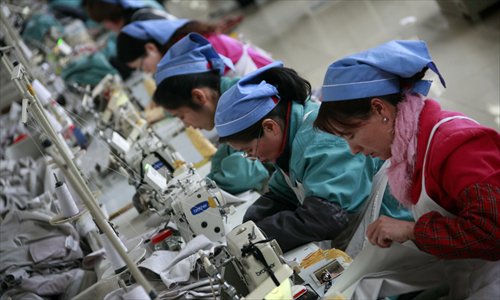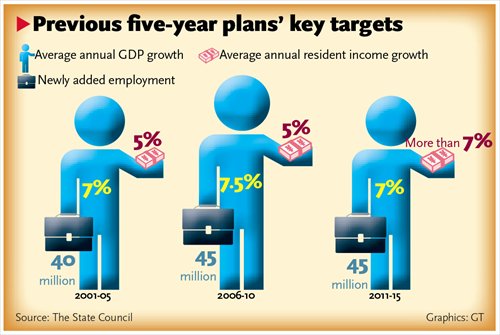HOME >> BUSINESS
Eastern provinces to push restructuring
By Liang Fei Source:Global Times Published: 2014-4-23 23:43:09

Female workers sew clothes to be exported to Europe at a garment factory in Huaibei, East China's Anhui Province, on Wednesday. Photo: IC

Eastern provinces will play a crucial role in the country's economic restructuring in the 13th Five-Year Plan (2016-20), an official at China's top economic planner said Wednesday.
"In formulating the 13th Five-Year Plan, we will put more thought into how to explore the advantages of the eastern coastal regions, in order to push the economic restructuring of the nation," Xu Lin, head of the department of development planning at the National Development and Reform Commission (NDRC), said at a press conference Wednesday.
China's five-year plans set out economic and social policy frameworks for the country, and need to be approved by the National People's Congress, China's top legislature.
At the press event, 25 research subjects were announced. The topics include economic restructuring, environmental protection, promoting innovation, and increasing consumption.
Xu said that the eastern provinces have better foundations for economic restructuring, as they contribute around 57 percent of China's total GDP, and account for over 70 percent of the total number of patents filed in the country.
"It is a pressing issue to drive economic restructuring in eastern provinces, as the region is losing its competitive edge amid rising costs and the appreciation of the yuan," Xu Hongcai, director of the Department of Information under the China Center for International Economic Exchanges, told the Global Times Wednesday.
"Some labor-intensive companies could be relocated to central and western provinces, and this could also help develop the economy in inland areas," said Xu Hongcai.
But Tian Yun, an expert at the China Society of Macroeconomics under the NDRC, said inland provinces should avoid repeating mistakes made in the coastal regions, such as harming the environment for the sake of development.
Xu from the NDRC made clear at the press conference that environmental protection will remain a focus during the 13th Five-Year Plan period.
China has set a goal to build a moderately prosperous society by the end of the 13th Five-Year period. But Li Pumin, secretary-general of the NDRC, emphasized at the press conference that China will not roll out short-term stimulus policies in order to boost growth.
In the first quarter this year, China's GDP slowed to 7.4 percent year-on-year. But Li said that the reform efforts "will inject new vitality into economic development."
Xu Hongcai noted that the government is hoping consumption can boost development, rather than investment and exports.
But Tian said that the government should make efforts to guarantee social fairness when allowing the market to play a major role in resource allocation, as a large income gap could hurt consumption.
Xu Hongcai also remarked that reducing the income gap and enlarging the middle class is vital to avoid a "middle income trap," which refers to a phase when a country that has attained a certain income gets stuck at that level.
At the press conference, Xu Lin also emphasized the importance of establishing a coordinated development mechanism covering different regions, and said the market should play a major role in allocation of resources. In sectors with fully developed competition, the government will reduce its role, he said.
Xu said that the NDRC is still working on a plan for coordinated regional development of Beijing and Tianjin municipalities and Hebei Province.
Posted in: Economy